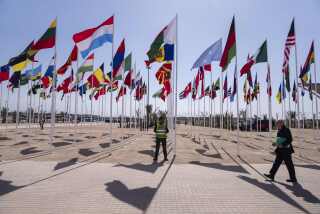IMF OKs Anti-Crisis Aid Program
- Share via
WASHINGTON — Hoping to prevent a future round of global financial mayhem, the International Monetary Fund on Sunday said it would provide vast sums of credit to nations that follow fiscally sound economic policies yet face potential financial panics.
The IMF announcement, endorsing an approach pushed by the United States, is the most significant policy response to the financial meltdown that touched all corners of the developing world during the last two years, menacing the entire global economy.
The idea is that the very potential for rescue money--before it’s actually needed--would prove beneficial and diffuse rising investor anxiety, perhaps even more than the provision of such aid after a crisis becomes full blown.
In addition, advocates view the approach as a way to encourage emerging nations to pursue responsible economic policies, which also would make their currencies less of a target for financial attack.
“In creating this facility, our dream is never to have to activate it,” Michel Camdessus, the IMF’s managing director, told reporters Sunday. The new policy, he added, will give countries “a supplementary line of defense before they are hit by contagion.”
The term “contagion” quickly entered the vocabulary of national leaders and economists, after financial turbulence spread relentlessly from Asia to Russia to South America beginning in July 1997.
The IMF announcement came as leaders of the world financial community were converging on Washington for a series of meetings and informal get-togethers this week, largely focused on the state of the global economy, which remains very weak outside the United States.
While the IMF manages billions of dollars in loan programs to assist nations that are suffering financial woes, it has not previously had a major effort to prevent such troubles--particularly in the form of global panics that can spark a dangerous outflow of capital--from starting in the first place.
In a statement Sunday, U.S. Treasury Secretary Robert E. Rubin applauded the IMF decision.
It “carries through on President Clinton’s call for an expanded capacity to help maintain confidence when countries face the threat of financial contagion,” Rubin said. “We welcome this improvement in the international financial system to prevent and contain crisis.”
Outside of the strategy for “contingent credit lines,” Rubin and other U.S. officials are pushing a more modest series of steps to shore up the global financial system, including technical plans to ensure that the poorest countries get emergency loans in times of crisis.
In recent weeks, questions about the allocation of new IMF help have focused on the Western Hemisphere, where Brazil remains at risk of further financial turmoil and Mexico has managed to stay more on the periphery of recent events. Camdessus suggested Sunday that it was premature to say which country, if any, would receive the credit, noting that any approvals would only come after an analysis of the applicant’s economic policies.
But he pointed to Brazil as a candidate, noting that the South American nation had recently imposed sounder fiscal policies, which had been dictated by a separate infusion of IMF cash.
“We would have been making the mistake of the year,” Camdessus said, to grant Brazil a new credit line before it reformed its spending policies. But “I hope sometime in the future, sometime down the road, Brazil could apply for this facility,” he added.
Some critics have argued that if a country actually were pursuing highly responsible economic policies, it would not be subject to the sorts of dangers that have inspired the new strategy. If a country did tap the credit line, some have warned, the result would be a disruptive stampede of capital out of the country.
Inside the 182-nation IMF, some members feared that the program could hurt the fund financially; some also questioned the ability to arrive at a set of reasonable financial guidelines for qualifying for the money.
Despite such qualms, IMF officials ultimately concluded that policymakers needed some new way to take measures to restore investor confidence before a crisis becomes full-blown. “It enables IMF support to be provided in a preventive rather than a reactive mode,” said Stanley Fischer, the IMF’s first deputy managing director, in a speech last week.
Under the IMF approach, countries would have to meet various guidelines to qualify for contingent credit, including maintaining good relations with their creditors and avoiding huge budget deficits.
“The [contingent credit line program] provides short-term financing, if the need arises, to help members overcome the exceptional balance of payments financing needs that can arise from a sudden and disruptive loss of market confidence due to contagion,” the IMF said.
IMF officials said Sunday that loans under the new program would probably fall in a range of 300% to 500% of a country’s IMF “quota”--an amount, for example, that could mean $20.5 billion for Brazil. Such loans would come with interest rates as much as 5 percentage points above other IMF loans, currently costing close to 5%.
The IMF’s board approved the credit program for two years with a review of the operations scheduled after the first year.
Asked whether the global financial crisis had finally ended, Camdessus replied, “It seems to be.” But he also said nations needed to continue to work on efforts to ensure financial stability.
More to Read
Sign up for Essential California
The most important California stories and recommendations in your inbox every morning.
You may occasionally receive promotional content from the Los Angeles Times.













